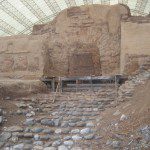
I taught this Gospel Doctrine lesson after the scheduled teacher was informed that his son was speaking in Primary. During that spontaneous teaching experience, I realized some things about the interconnectedness of the ten chapters leading up to Genesis 22.
In particular, I want to clarify why Genesis 22 unrolls the way it does. Isaac isn’t the sacrifice there just because “it’s the most horrific thing we can think of.” Abraham’s test goes far beyond that, but in order to grasp it, we have to start back in Genesis 12, and see how the events unfold, culminating with Isaac. Genesis 22 is thus intimately connected to the events of the preceding chapters, and if we ignore them, we misunderstand. This is one of those times we look so much at one tree that we miss the forest around it.
Good literature and film revolve around conflict, obstacles to be overcome. Think about the apparent lack of conflict and obstacles in 4th Nephi which probably explains why it’s so chronologically compressed. At least as it was passed down to Mormon and edited for us, it was a golden age of sorts, so there’s simply not a lot to write about.
Sometimes, there is a surprising twist (and sometimes the twists are not so surprising.) Looking at these ten chapters from a literary perspective will help make sense of the final events in Genesis 22. The “happy ending” that is obstructed in the Abraham narrative is the fulfillment of God’s covenantal promise set out in Genesis 12, land and offspring numerous as the sands of the sea.
Genesis 12-22 enumerate a dozen or so obstacles that must be overcome before the fulfillment of that promise. The primary and first obstacle is this; how is a barren and old couple going to have offspring? Second, being naturally childless or “barren” in Old Testament terms is one thing, but who can handle the stresses of pregnancy and a toddler at the age of 90 or so? A third major obstacle arises almost immediately, famine. If Abraham or Sarah die, there can be no heir(s) to fulfill God’s promises. They have to live, and the heir has to live. So Abraham does the logical thing and goes to Egypt, the breadbasket of the ancient middle east. Obstacle overcome!
As is so often the case, resolving one issue raises another. Once in Egypt, Sarah “was taken into Pharaoh’s household” (12:15). How can Abraham and Sarah have children if they are physically separated, and Sarah is sexually threatened by Pharaoh? (Such, at least, is the obvious intent of the Egyptians’ actions.) This obstacle is overcome by God, with no apparent negative effects but heightened tension… and Abraham becoming wealthy.
Abraham and Sarah, back together again, and famine apparently over, return to south Canaan. Now, a native reader might have a suspicion about the resolution of the plot that modern readers don’t. In Mesopotamia, Abraham’s homeland, childless couples might adopt a cousin or nephew as their “son” thus making him their legal inheritor and namesake. Indeed, Abraham’s nephew Lot becomes prominent at this point in the Abraham narrative. Are we meant to suspect that God’s promises might come through him? If so, what of this maybe-heir? While things initially seem quite good (the land is fertile, and they are so wealthy they can’t even live together), this is a head fake.
Almost immediately (Genesis 14), Lot’s life is at stake by being caught up in the middle of a war between kings, captured, and hauled north. If he is to be the heir, then the covenant and promise are threatened. Conflict! Obstacle! Abraham and 318 men rescue Lot, going as far north as Dan, which will later be the northern boundary of Israel. This implies a campaign of some days, even weeks. (Insert military action/training montage here?) But Lot is rescued, thanks to Abraham, and perhaps his servant Eliezer, whose Hebrew name adds up to 318, the oddly precise number of Abraham’s militarily trained men never before and never again mentioned.
Indeed, when we reach Genesis 15, God again promises land to Abraham’s innumerable offspring, Abraham explicitly opines that not Lot but his servant Eliezer will be his heir. “O Lord GOD, what will you give me, for I continue childless, and the heir of my house is Eliezer of Damascus?… You have given me no offspring, and so a slave born in my house is to be my heir.” (Not Lot but Eliezer will fulfill the covenant! Who saw that twist coming?) Again, in good Mesopotamian fashion, a faithful servant could also be adopted as heir. But God says not so; “This man shall not be your heir; no one but your very own issue shall be your heir.” (15:4)
Genesis 16 moves the plot forward, but sets up for yet more obstacles. In keeping with good Mesopotamian ways of treating infertility, Sarah proposes that they have a child through her servant Hagar. (This is not something she comes up with herself.) And lo! A child of Abraham’s flesh and blood, the beginning of the fulfillment! However, this child creates a rift. Sarah sends Hagar and Ishmael away, only to have them saved by an angel. In essence, the conflict between Sarah and Hagar is resolved by the angel instructing Hagar to submit to Sarah. That the angel tells Hagar that her descendants will be innumerable reinforces the idea that this is the covenantal son, the fulfillment of the promise to Abraham.
In Genesis 17, however, we read that God himself will overturn the primary obstacles in the way. Ishmael will not be the covenant son, because Sarah will become pregnant in spite of her age. Not only will the covenant son be of Abraham, but of Sarah as well, not a proxy. God renews the covenant, and gives Abraham a sign of the covenant, circumcision. Note Abraham’s remonstration, arguing that Ishmael is good enough (17:18). Skipping a bit (Sodom and Gomorrah, Sarah’s second abduction by the king of Gerar), we can see the end from here, can we not? Abraham and Sarah, the wealthy, righteous old couple with a son of their own, who both fulfills and propagates God’s covenant…. too bad they had that other son first. Ishmael apparently threatens Isaac in a way that triggers Sarah’s protective maternal instinct, and they are again sent away.
Finally, though, all threats are removed, all obstacles overcome. God has repeatedly made promises to Abraham which are beginning to be fulfilled and made him wealthy along the way. Isaac is the fulfillment of the covenant and the symbol of the future that they have fought for through 10 chapters, overcoming human (Pharaoh; the King of Gerar), military (Lot and the war), natural (famine), familial (Ishmael and problems with Lot), and all other obstacles.
But now a final obstacle arises, more threatening than all; not just an obstacle to fulfillment, it promises the very destruction of the covenantal blessings! Further elevating the tension, the one who set Abraham on this path by offering him the covenant is now the very one who threatens it! Abraham left his homeland and family because he was promised an entire land and a new innumerable family. For Abraham and Sarah, all of those past promises now culminate in Isaac, and all the future promises yet to be fulfilled are transmitted through him. His death would effectively symbolize a nullification of the covenant, no offspring, no land. Is Abraham willing to remain faithful to God even if He sweeps away the covenantal promises of land, children, and the accompanying wealth? (Echoes of the rich young man in Luke 18?)
It’s easy to follow someone when each step, difficult as it may be, has a definite payoff, as Abraham has received all along the way. It’s much more difficult to remain faithful when no such blessings materialize at each step. Does Abraham remain faithful because it is right, or because he benefits from it? Will he remain faithful if he ceases to benefit from it? Is he willing to forgo everything God has promised after fighting for it for so long, and overcoming so many obstacles?
To answer the original question, then, the sacrifice must be Isaac not because of the utter horror of a father killing a son (though that certainly contributes in a very visceral way), but because of everything Isaac stands for; similarly, the sacrifice must be performed by Abraham, because he is the one who was promised everything Isaac represents. The tension and stakes have been built up over 10 chapters, and just as it appears to be resolved, the final twist is that it may all come crashing down, dependent on Abraham’s decision.
That is the full extent of the test of Abraham’s faithfulness.
There are a
host of scriptural and historical incidents that illustrate how unwavering obedience is sometimes more flexible than deciding our own limits. The hazard of inflexible obedience is that we accept directives that are not from God; the risk of deciding our own limits is that we reject commandments that are of God. From Abraham to Heber C. Kimball and up through today, the Lord has had the unnerving habit of wrenching heartstrings and asking the preposterous. It seems that counting the cost is something the Lord expects from generals and architects, but dislikes in his disciples. The Abrahamic tests go beyond the bounds of rational theology, at least in the moment when decisions are made. To say “this cannot be of God,” “beyond here I will not go,” or “God would never ask this” is to run the risk of being too narrow, and almost certainly the demands of discipleship will press us until we shatter like glass.
– “What Sunstone Means to People Like Me.” Sunstone, July 1981.
As always, you can help me pay my tuition here, or you can support my work through making your regular Amazon purchases through the Amazon links I post. You can also get updates by email whenever a post goes up (subscription box on the right). You can also follow Benjamin the Scribe on Facebook.











